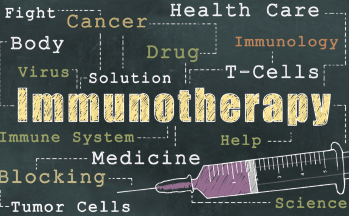
© T. L. Furrer / shutterstock.com
Immunotherapy is an exciting new option for aggressive head and neck cancers and, in combination with radiation, may even help patients who resist immune checkpoint blockade, said panelists at a symposium October 8, 2018, at the AAO–HNS Annual Meeting in Atlanta. The Korean Society of Otorhinolaryngology-Head and Neck Surgery and the Korean American Otolaryngology Society co-sponsored the symposium.
Explore This Issue
November 2018Cancer Treatment’s New Frontier
“Immunotherapy is based on the idea that when cancer cells develop, they undergo mutations, which then change the expression of the surface antigens of tumor cells sufficiently enough so the immune system can now recognize the tumor cells as foreign entities, and can mount an immune reaction to them,” said Seungwon Kim, MD, associate professor in the department of otolaryngology at the University of Pittsburgh Medical Center (UPMC).
The programmed-death ligand (PD-1/PD-L1) pathway is essential in immunotherapy. The immune system mounts an inflammatory response to infection or what it perceives as foreign invaders. Cells present antigens via the major histocompatibility complex (MHC), which then bind to receptors on T cells.
“This results in T-cell activation, which propagates an inflammatory reaction. But, just like any other process in the body, once this process starts, at some point it needs to stop; otherwise, the process will continue unchecked, leading to autoimmune disorders,” said Dr. Kim. T-regulatory (T-reg) cells express PDL-1, which binds to a PD-1 receptor on the T cell, inhibiting the T cell and stopping the inflammatory response. Tumors tend to “kidnap” the body’s normal mechanisms, however. The immune system recognizes a tumor cell as foreign, and sends lymphocytes to infiltrate it and mount a cytotoxic reaction. Tumor cells respond by producing PD-1 to bind to the receptor on the T cells and turn them off.
“The argument for immunotherapy is that if you can break this reaction, by utilizing either an antibody against the ligand or the receptor of the PD1/PD-L1 pathway, it will reactivate those T cells, leading to the T cells mounting a cytotoxic reaction against the tumor cells,” he said.
Two immunotherapies are currently approved for use as second-line agents in patients with recurrent or metastatic head and neck squamous cell carcinoma (R/M HNSCC) who have failed the standard EXTREME regimen of cetuximab, cisplatin or carboplatin, and 5-FU: nivolumab (Opdivo) and pembrolizumab (Keytruda).
Relevant clinical trials, such as the KEYNOTE-012 Phase I-b trial of pembrolizumab and CheckMate-141 of nivolumab, have shown that these drugs have similar efficacy and adverse events, most frequently hypothyroidism (J Clin Oncol. 2016;34:3838–3845; Oral Oncol. 2018;81:45–51). Both are both superior second-line agents compared to the standard of care approach in these patients, he said.